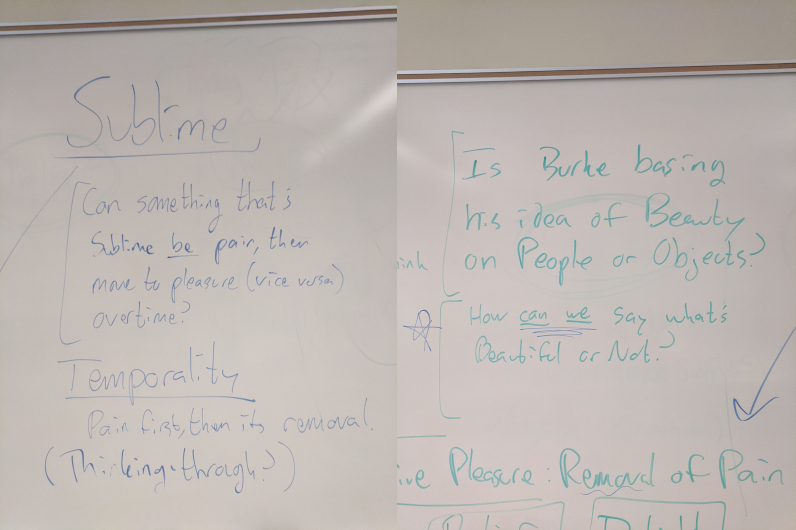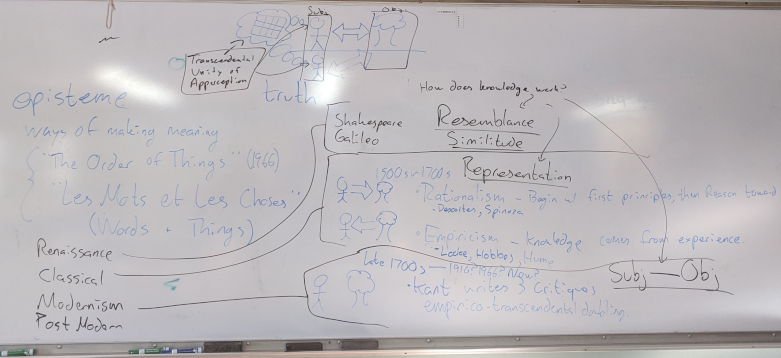(This page last updated )
From 2014-2020 I worked as an adjunct lecturer in both philosophy and music. I generally taught two or three courses per semester. I was teaching at a small and rural liberal arts university in Maine (University of Maine at Farmington) where I had a great deal of freedom. I designed every course I taught, and was also encouraged to propose new special topics courses.
My approach to teaching
I want to be a collaborator.
There should be space in the classroom for everyone. This doesn’t mean that everyone needs to be comfortable. Being uncomfortable is necessary. Space in the classroom means there needs to be space for every student to be heard, to be taken seriously. It means the presencing of particular perspectives. It means the challenging of fixed views. I want to be pleasantly surprised by the things my students teach me.

Figure 1: some questions posed by students during a session of Philosophy of Music, February, 2020.
I think ideas, taken on their own for their own sake, can be beautiful and instructive and Good. But I also think that it is very easy to talk only about ideas, and that therefore it is easy to keep conversation ungrounded and detached from lived experience. Ignoring the concrete world of lived experience, the texture of things, the things themselves, is a privilege. Ignoring the world means living in a dream. It can be easy to default to that mode of teaching. I want those who default to the dream of ideas to wrestle with the feeling and force of being awake to the world around.

Figure 2: the whiteboard after one of my classes, January, 2019.
I want my love for my subject to be evident. I used to care about that because I hoped that I could impress that love onto my students (cf. bell hooks, Teaching to Transgress). I get that that doesn’t work, though. Not always. The task recently has been to communicate, instead, an idea about what love is and what it means. I want to demonstrate a love that does not consist in merely liking something a lot. Or simple admiration. I want students to see that you can love something and be frustrated or hurt by it, too. That that frustration can in fact be entirely due to love–to like something so much, to see its beauty and its faults, and to be hurt by those faults and yet to care enough to want to fix those faults.

Figure 3: the whiteboard after a discussion of phenomenology, January, 2020.
What do my students want? This probably should be the first question I ask, and yet it’s the last one to come to me while writing this. The first thing I wrote was “I want to be a collaborator.” I think that is a good thing to want to be. But the “I want”–that should not be given priority in the classroom, and so it shouldn’t be given priority in my teaching philosophy. “What do my students want?” is the more appropriate beginning because that question can’t be asked without there already being a “classroom” (as opposed to “I want” which needs no one else but me). My students want to sleep more than they do, and spend time with friends, and some of them truly, sincerely want to leave school because this just isn’t their jam. They want to pass. I’m not interested in those answers, though, at this moment (though they do matter).
So what do my students want? They want to be happy–or at the very least not to suffer. They want to go beyond the most basic survival in the world, and that means experiencing things like loving and being loved. They want to be Good, and I think they want to be able to know how to tell if they’re being Good. I can’t hand them solutions for any of these things, but I can show them that they can think about these things if they’re not already (they probably are to some extent, though they may not be noticing it). Hopefully I can also show them how open-ended thinking is. I mean how endless it is. I mean how unfinished it always is.
Some courses I designed and taught
- Postmodernisms
- This course begins with Maurice Merleau-Ponty and a consideration of the limits of philosophy itself. We then take our time with writings by Derrida, Foucault, Lyotard, Barthes, Sontag, Spivak, and Cixous, emphasizing an idea of postmodernism as synonymous with an ongoing and self-critical project, both ethical and epistemological, of thinking difference itself. I stole the course name from one (with differences in content and aim) taught by my late professor and mentor, Hugh J. Silverman.
- Laptop Orchestra
- A study of electronic music, with a focus on using the open source software Pure Data to teach students the theory and technique of sound synthesis and digital signal processing. We also discussed the history of electronic music and practiced its performance, culminating in a public concert at the end of the semester.
- Musicianship Through Songwriting
- A course for music majors and non-majors studying music theory, aural skills, and composition. Highly individualized based on student backgrounds, interests, and needs. Student projects could end up looking like a String Quartet, a folk song, an electro-acoustic composition, an improvised performance to a graphic score, or a homemade instrument.
For more info:
My complete teaching experience is here.
Invited Presentations
I have been invited to give talks or lectures for other classes or events:
-
“Introduction to Structuralism and Saussure’s Semiology” (lecture). Given to upper-level English and Creative Writing classes at University of Maine at Farmington, 2018-2019.
-
“Philosophical Context for and Overview of Jean-Luc Nancy’s Philosophy” (lecture, followed by panel discussion). For Music In The Museum: Morton Feldman’s Last Pieces, and Hearing, Listening (and Seeing) à la Jean-Luc Nancy. Colby College Museum of Art, Waterville, Maine. November 3, 2016.
-
“The Play of Difference” (lecture). Part of The Opus 111 Project: Intermedia Variations on Beethoven’s Last Piano Sonata. Emery Community Arts Center, Farmington, Maine. November 12, 2014.
Advising
- From 2015-2020 I advised students in the Liberal Arts Undeclared program at the University of Maine at Farmington. In addition to fulfilling the role of academic advisor, I met with my advisees regularly to counsel them as they determined what major they would declare or, in several cases, if they really wanted to be a student at the university at all. I brought to this work patience, care, and attention to the needs of my advisees.
Awards
- Outstanding Faculty Award, 0-5 years of service, 2018. Awarded by University of Maine at Farmington Campus Residence Council.